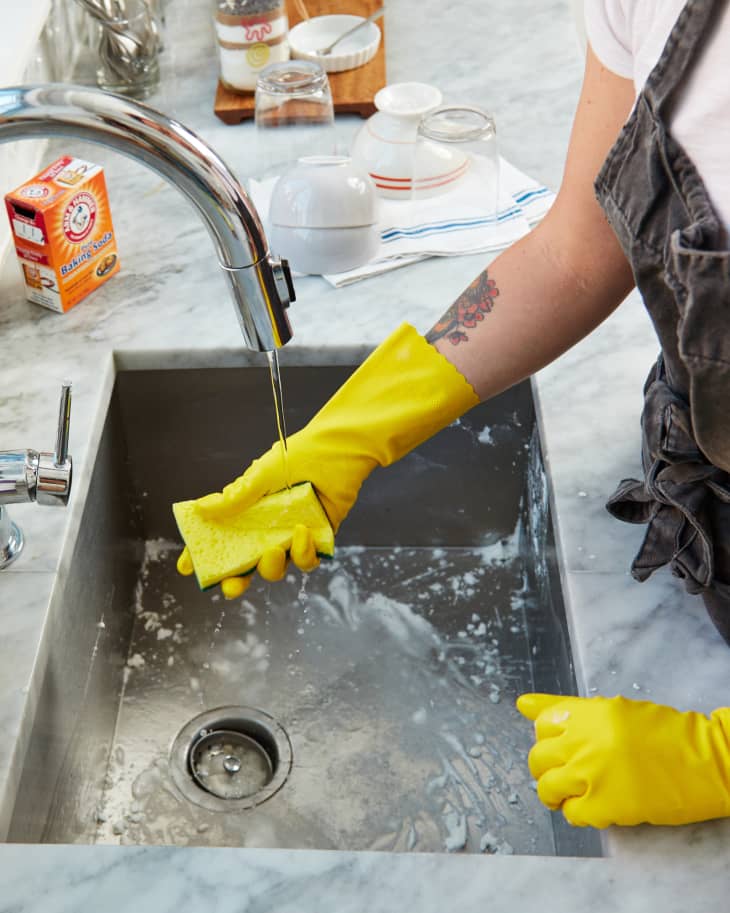This Precious “Times Left” Psychological Trick Has Helped Me Get More Done in the Kitchen
Here’s what happens when I’m in the kitchen: I’m washing dishes, and I look out the window and see the fuchsia that refuses to just relax and enjoy its life, so I pop out to water it. Then, I come back to the dishes and turn on The Splendid Table podcast, which reminds me that, oh no!, my daughter’s lunch card is out of funds. I pull up the parent portal “so I don’t forget,” and then I head back to the sink, but oh my god, there are wet clothes in the washer. Then, the alarm to feed the dog goes off. And my husband says, “Did you do the Wordle yet?” No, but now seems like a good time.
I could accept this time poverty as a fact of life: There’s just too much to do and not enough time. The thing is, my husband doesn’t have this problem. We’re both capable adults; the quality of our work is comparable. So, why can he cover twice as much ground as I do when we clean our home? Why is dinner on the table in half the time if he’s cooking?
For years I’ve joked (and secretly believed) that he carries some magical ability, covertly whispering scourgify to our plates and cups (that one’s for my Harry Potter lovers). But it turns out, according to expert psychologists, there’s a reason it takes me forever to cook and clean — and it’s totally fixable.
Do one thing at a time.
At the end of the day, all of those mini interruptions feel urgent, but they really aren’t. The cafeteria won’t refuse my daughter a lunch if her card is empty. The fuchsia will still be thirsty after the dishes are clean. The clothes will still be wet.
Not only does all that task-switching make me less efficient (and more prone to errors!), it also stresses me out. In a recent study, Gloria Mark, Ph.D., a psychologist and professor who studies how technology affects our attention, mood, and stress levels, found a “correlation between frequency of attention switching and stress.” Participants’ heart rates literally sped up the faster the attention switching occurred, and they self-reported feelings of anxiety or agitation. Yeah, me too.
Turn off the phone and find the flow.
I was listening to Dr. Mark on double-time and cooking dinner when I heard the podcast host say, “I know some people who feel like they’re so time crunched that when they… listen to a podcast, they turn up the speed to 1.5 or 2.” I felt seen, and not in a good way.
Here’s the thing: I genuinely thought I was doing it right, bundling two important activities, some might even call it “habit stacking.” How is that not more efficient? But I realize now that all the attention switching — pausing the audio to read the next step in the recipe, for example — meant I wasn’t able to get into the flow of cooking.
“Flow,” a term coined by psychologist Mihaly Csikszentmihalyi, is a type of optimal attention, when you’re so immersed in a task that time becomes irrelevant. Think peak creativity, when the world disappears and it’s just you and something beautiful you’ve made, like a perfectly plated, colorful meal. That’s definitely not going to happen if I’m fielding texts while sautéing mushrooms.
Be where your feet are.
All of this comes down to one concept: Be present. Cassie Holmes, Ph.D., studies how time affects happiness, and recommends a counterintuitive exercise to help with this goal: Count how many “times left” you have to do something you value.
If I start calculating how many daily meals we’ve had as a family of four, and how many we have left, I realize that 72 percent are behind us, and only 28 percent are left. We’ve already eaten most of the family meals we’ll have together before my kids leave the house. While you might think that would make me sad, it actually motivates me to savor each one we have left, instead of being frazzled by minutiae.
What began as an exercise to make me more efficient in the kitchen, did much more. I’m faster, yes, but I’m happier, too. And the best part is that mindfulness, which it turns out is all it takes to increase both efficiency and happiness, is totally and completely free.
